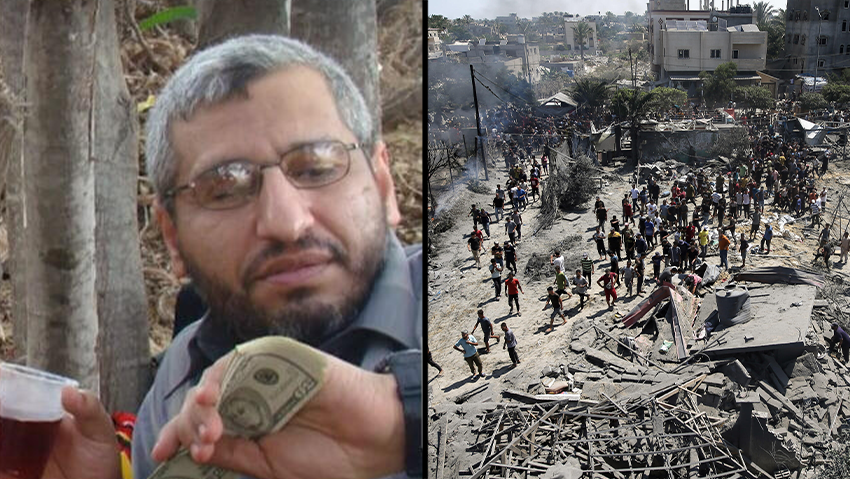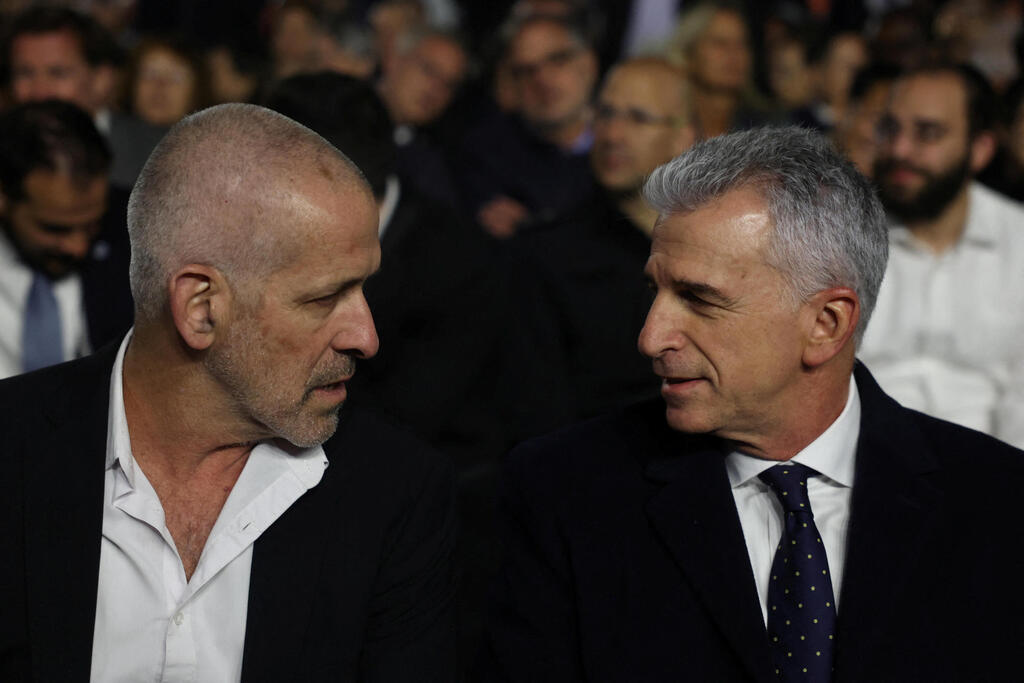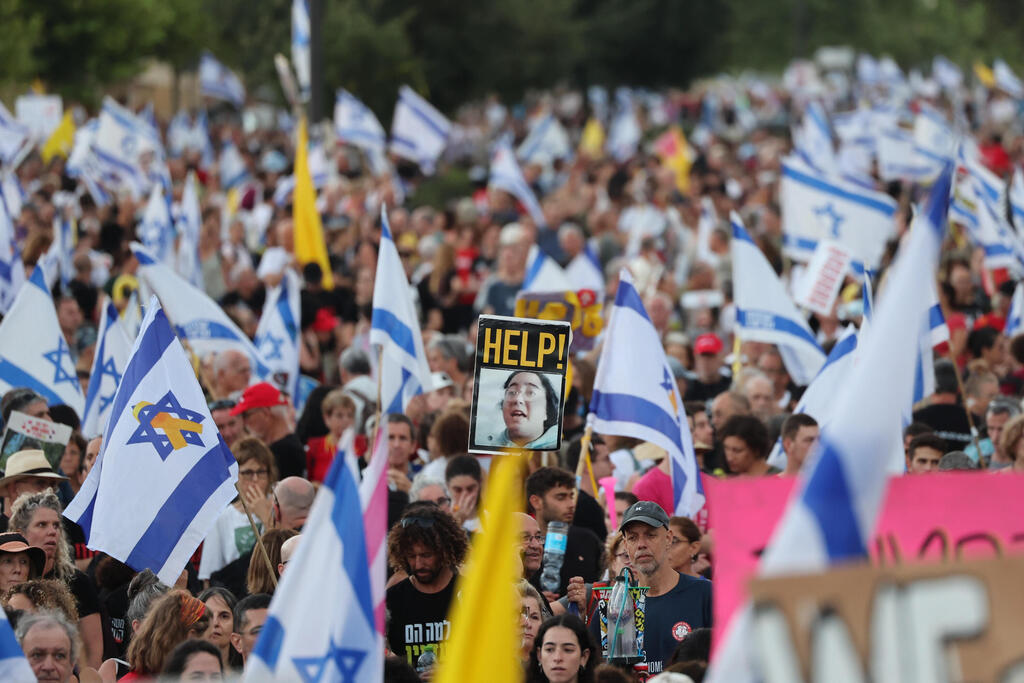Getting your Trinity Audio player ready...
Egyptian sources said on Sunday that talks for a cease-fire and hostage release deal were halted after the attack in Gaza on Saturday in an attempt to kill Mohammed Deif the leader of the Hamas military wing.
Hamas denies Deif was killed in Khan Younis but confirmed that the commander of the Khan Younis brigade for the terror group, Rafa Salama did die in the strike. The IDF said it could not confirm that Dief, who has survived at least six attempts on his life in recent years, was killed.
The Egyptian sources told Reuters that talks were halted "until Israel proves it's serious."
Two sources claimed that despite three days of "intensive" discussions last week, no tangible outcome was achieved, accusing Israel of lacking genuine intent to reach an agreement. They said that the behavior of Israeli representatives reflects "internal conflict" on their side, a comment linked to our analyst Ron Ben-Yishai's report on the rift between Prime Minister Benjamin Netanyahu and the heads of the Mossad and Shin Bet.
The Egyptian sources alleged the Israeli delegation agreed to terms discussed in the talks but then returned with amendments or new conditions that could "collapse the negotiations." They criticized what they described as "contradictions, delays in responses, and presenting new conditions contrary to previous agreements," implying the Israeli side views the negotiations as merely a formality to influence public opinion.
Israeli officials denied any freezing of the talks. Mossad Chief Dedi Barnea was set to travel to Cairo to continue the discussions but it was unclear if and when he would depart.
Senior Hamas official Khalil al-Hayya said in an interview late on Saturday, that the terror group was waiting to receive proposals from the mediators after they submitted their response to the Israeli offer for a deal.
Al-Hayya, who claimed Deif was not killed and accused Netanyahu of "not wanting" an agreement. "All options are open to us, and we will not give Netanyahu what he wants," he told Qatari-based Al Jazeera. "We are waiting for the mediators after presenting a clear outline. Netanyahu acts like a man in crisis, cornered. He wants to shuffle the cards, and we are still waiting."
Bassem Naim, a member of Hamas's political bureau, also spoke to Al Jazeera, threatening that negotiations for a deal might be halted. "Every time we get close to reaching an agreement, Netanyahu commits a new crime. Withdrawing from the negotiations is one of the options on the table, and we are not operating according to Netanyahu's agenda," he said. Hamas political bureau chief Ismail Haniyeh, meanwhile, stated he conducted talks with mediators and regional countries, calling on Egypt and Qatar "to do what is necessary to stop these massacres."
Netanyahu addressed the negotiations for a deal at a press conference following the assassination attempt, reiterating his position that military pressure is essential to advance a deal, and criticizing the IDF.
"For months, there was no progress because the military pressure wasn't strong enough. I believed both for the sake of a deal and for victory over Hamas, we had to enter Rafah. There was immense international pressure not to enter. There was American pressure not to enter. There was also a reduction in arms supply, to put it mildly, and I told my friend Biden: we have no choice – we will enter Rafah. And we entered Rafah and killed 900 terrorists. We killed hundreds of terrorists in other parts, and suddenly things started to move," he said.
"If there is a change in the situation, it is due to the change of strong military pressure and firm standing on our conditions; this is what brings the changes," Netanyahu claimed, adding: "I completely reject the briefings saying I am hardening and preventing a deal. Quite the opposite. I am enabling it." Regarding the negotiations themselves, he said: "I am not deviating from the outline blessed by President Biden. Not adding conditions, not subtracting, but also not allowing Hamas to move a millimeter from it. Hamas requested 29 changes to the outline, and I told the negotiating team and the Americans – not even one change."
Brother of the hostage: "Mixed feelings"
At the press conference, Netanyahu said it was still unclear if Deif and Salameh were indeed killed, but he promised the effort to target senior Hamas figures would continue at all times. "I want to assure you that one way or another, we will reach all the senior Hamas leadership," he said adding that before approving the operation, he ensured no hostages were nearby and assessed the collateral damage and types of munitions: "When I received satisfactory answers, I gave my approval for the operation."
Senior security officials estimate that the assassination attempt would not impact the negotiations for a deal and that if there is any effect, it would be a short tactical delay, not a breakdown. They said they believed talks would resume in the coming days and that the attack on senior figures in Hamas would push the terror group towards a ceasefire. They also noted that after the March attack on Marwan Issa, third in command in Hamas, negotiations continued.
Israel says most casualties in the strike were terrorists
The strike on Saturday was near the Al-Mawasi area close to the coast in southern Gaza and the city of Khan Younis. It was designated a humanitarian safe zone and contained a large number of Gazan's fleeing the fighting in the Strip.
The IDF said the strike targeted an enclosed Hamas compound, not the displaced persons' tents. According to Palestinians, about 90 people were killed and another 300 were injured in the strike, with Hamas claiming they were civilians. An Israeli source said most are terrorists.
The strike was carried out with various types of missiles and munitions, including fighter jets and UAVs, in a larger quantity than previous assassination attempts on senior Hamas figures during the war. In total, about five massive bombs were dropped, including a "bunker buster." The reason was to ensure the elimination of the two targets, Deif and the Khan Younis brigade commander Salameh, who was nearby.
The green light for the strike was given by Netanyahu and Defense Minister Yoav Gallant after midnight, following precise intelligence based on technological tracking and listening capabilities but also on human surveillance on the ground, which led to cross-referencing and final confirmation Deif was indeed at the site attacked, among "huts," sheds, and palm trees. Final intelligence showed Deif emerged from the tunnels to the ground, presenting a rare opportunity to eliminate him. This information on Deif and Salameh's location came from a special combined unit of Military Intelligence and Shin Bet, designed to constantly monitor and acquire locations of critical targets and hostage whereabouts.
Although Hamas denies Deif was killed, the Saudi-based Al-Hadath network reported the terror organization was investigating a "major internal breach" behind the strike. Perhaps hinting at the assassination, the Khan Younis brigade of the terror organization released previously unseen photos of Deif, accompanied by the caption: "We follow you." They also wrote alongside the photos: "If Deif goes to the sea, we will do it, we will enter the sea with him and will not hesitate."




